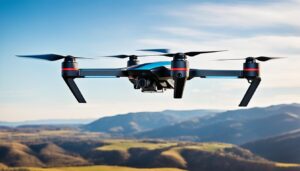Drones rely on LiPo batteries for power, making battery life a crucial factor for performance. Drone battery life depends on various factors such as voltage, capacity, and discharge rate. These batteries provide high energy density and lightweight construction, making them ideal for drones. However, they require careful management to prevent issues like overheating, overcharging, and imbalance between cells.
To ensure long-lasting drone LiPo battery life, battery management systems (BMS) are essential. BMS helps regulate power distribution and ensures that the LiPo battery for drone operates efficiently. Without a BMS, a UAV battery could degrade quickly, reducing overall performance and flight time.
Essential BMS Functions for Drone Battery Life
A battery management system (BMS) plays a key role in extending drone battery life by monitoring and controlling different aspects of the battery. It helps regulate voltage, temperature, and charge levels. A good BMS ensures that the LiPo battery for drone maintains stable voltage levels during flight, preventing potential failures.
Additionally, BMS helps in optimizing energy usage, which is crucial for drones operating on 12s voltage configurations. It ensures that all cells function uniformly, reducing wear and extending battery lifespan. Drone battery manufacturers design their BMS to meet industry standards and provide reliable performance.
Cell Balancing for Extended Drone Battery Life
One of the main functions of a BMS is cell balancing. A drone LiPo battery consists of multiple cells, and these cells must have equal voltage levels to ensure a stable power supply. Without proper balancing, some cells may overwork, leading to a reduced drone battery life.
BMS continuously monitors and adjusts the charge levels of each cell to keep them in balance. This is particularly important in UAV battery systems, as an unbalanced battery can lead to reduced efficiency and potential safety risks. Drone battery manufacturers integrate cell balancing technology into their BMS to enhance battery longevity.
Temperature Monitoring and LiPo Battery for Drone Safety
Temperature control is crucial for a LiPo battery for drone. Overheating can damage the battery and reduce its performance. A BMS includes temperature sensors that monitor battery heat levels in real time. If the temperature exceeds safe limits, the BMS takes corrective action to prevent overheating.
Drone battery manufacturers implement thermal management features in their BMS to improve drone battery life and safety. This is especially important for drones operating in extreme environments. A well-regulated UAV battery ensures consistent performance without the risk of overheating.
Overcharge/Overdischarge Prevention: Safeguarding UAV Battery Health
Overcharging and overdischarging are two major risks that can damage a drone LiPo battery. Overcharging can cause overheating and potential battery failure, while overdischarging can permanently reduce battery capacity. A BMS prevents both issues by monitoring voltage levels and stopping excessive charge or discharge.
By maintaining optimal charge levels, a BMS helps extend the lifespan of a LiPo battery for drone. Drone battery manufacturers incorporate advanced protection mechanisms in their BMS to ensure safety and reliability. This feature is especially important in 12s voltage battery systems, where managing charge levels is critical.

BMS and 12s Voltage Systems Management
Many high-performance drones use 12s voltage systems for increased power output. Managing such a high-voltage system requires an efficient BMS. The BMS ensures that all battery cells function properly and that voltage levels remain within safe limits.
Without proper management, a UAV battery with 12s voltage could experience irregular performance and potential failures. Drone battery manufacturers design their BMS specifically for 12s voltage setups to maximize efficiency and flight time.
UN 38.3 Standard and BMS Integration
The UN 38.3 standard is a safety regulation for lithium batteries, ensuring they meet global transportation and usage requirements. A BMS helps batteries comply with this standard by maintaining safety protocols such as thermal monitoring, overcharge protection, and voltage regulation.
Drone battery manufacturers must ensure their BMS systems align with the UN 38.3 standard to make their products safer for users. Integrating BMS with UN 38.3 standard compliance enhances the reliability of a drone LiPo battery in various operating conditions.
BMS and Drone Flight Time Optimization
One of the key benefits of using a BMS is improving drone battery life by optimizing flight time. The BMS manages power consumption effectively, reducing unnecessary energy loss and maximizing efficiency.
By ensuring balanced power distribution, the BMS allows drones to fly longer without draining the UAV battery too quickly. Drone battery manufacturers develop their BMS technology to help drone operators achieve extended flight durations without compromising performance.
Data Logging: Monitoring Drone LiPo Battery Health
A modern BMS includes data logging features that track battery performance over time. This helps users monitor their drone LiPo battery health, detect potential issues, and take preventive actions before major failures occur.
With real-time data on voltage, temperature, and charge cycles, drone operators can make informed decisions about battery maintenance. Drone battery manufacturers integrate smart data tracking into their BMS systems to enhance battery reliability and performance.
Choosing Drone Battery Manufacturers with Robust BMS
When selecting a UAV battery, it is important to choose drone battery manufacturers that provide high-quality BMS technology. A well-designed BMS ensures better drone battery life, improved safety, and longer operational efficiency.
Reliable drone battery manufacturers follow industry standards and incorporate advanced BMS features like cell balancing, thermal protection, and overcharge prevention. Investing in a high-quality LiPo battery for drone with an efficient BMS is crucial for long-term drone performance.
The Future: Advanced BMS and Drone Battery Life
As drone technology advances, BMS systems are becoming more sophisticated. Future BMS solutions will include AI-powered monitoring, wireless communication, and real-time adaptive power management to further optimize drone battery life.
The integration of BMS with 12s voltage and UN 38.3 standard compliance will improve the safety and efficiency of drone LiPo batteries. Drone battery manufacturers are continuously innovating to provide better power management solutions, ensuring that drones operate efficiently and safely for extended periods.
Conclusion
A battery management system (BMS) is essential for optimizing drone LiPo battery performance and safety. By managing voltage, temperature, and charge levels, a BMS enhances drone battery life and ensures stable operation. Whether balancing cells, preventing overcharge, or complying with the UN 38.3 standard, a BMS plays a crucial role in extending the lifespan of a LiPo battery for drone. As technology advances, drone battery manufacturers will continue to develop smarter BMS solutions to improve the future of drone power management.




